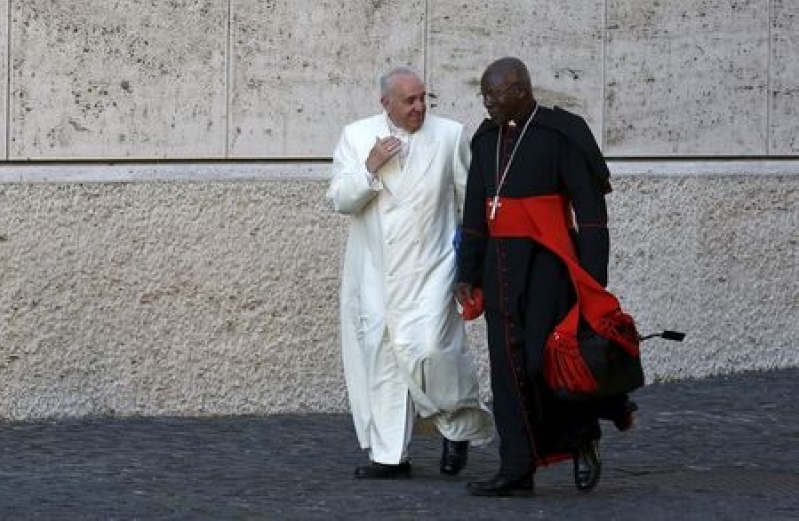
Pope Francis, ending a contentious bishops' meeting on family issues, on Saturday excoriated immovable Church leaders who "bury their heads in the sand" and hide behind rigid doctrine while families suffer.
The pope spoke at the end of a three-week gathering, known as a synod, where the bishops agreed to a qualified opening toward divorcees who have remarried outside the Church but rejected calls for more welcoming language toward homosexuals.
It was the latest in a series of admonitions to bishops by the pontiff, who has stressed since his election in 2013 that the 1.2 billion-member Church should be open to change, side with the poor and rid itself of the pomp and stuffiness that has alienated so many Catholics.
In his final address, the pope appeared to criticize ultra-conservatives, saying Church leaders should confront difficult issues "fearlessly, without burying our heads in the sand."
He said the synod had "laid bare the closed hearts which frequently hide even behind theChurch's teachings or good intentions, in order to sit in the chair of Moses and judge, sometimes with superiority and superficiality, difficult cases and wounded families".
He also decried "conspiracy theories" and the "blinkered viewpoints" of some at the gathering, and said the Church could not transmit its message to new generations "at times encrusted in a language which is archaic or simply incomprehensible".
The outcome of the gathering, over which the pope presided, marked a victory for conservatives on homosexual issues and for progressives on the thorny issue of remarriage.
The final synod document restated Church teachings that gays should not suffer discrimination in society, but also repeated the stand that there was "no foundation whatsoever" for same-sex marriage, which "could not even remotely" be compared to heterosexual unions.
The 94-article document indicated that the assembly had decided to avoid overtly controversial language and seek consensus in order to avoid deadlock on the most sensitive topics, leaving it up to the pope to deal with the details.
The synod is an advisory body that does not have the power to alter church doctrine. The pope, who is the final arbiter on any change and who has called for a more merciful and inclusiveChurch, can use the material to write his own document, known as an "apostolic exhortation".
HOPE FOR DIVORCEES
The synod document did offer some hope for the full re-integration into the Church of some Catholics who divorce and remarry in civil ceremonies.
Under current Church doctrine they cannot receive communion unless they abstain from sex with their new partner, because their first marriage is still valid in the eyes of the Church and they are seen to be living in an adulterous state of sin.
They only way such Catholics can remarry is if they receive an annulment, a ruling that their first marriage never existed in the first place because of the lack of certain pre-requisites such as psychological maturity or free will.
The document spoke of a so-called "internal forum" in which a priest or a bishop may work with a Catholic who has divorced and remarried to decide jointly, privately and on a case-by-case basis if he or she can be fully re-integrated.
"In order for this happen, the necessary conditions of humility, discretion, love for the Churchand her teachings must be guaranteed in a sincere search for God's will," the document said.
Tally sheets showed that the three articles on the divorced and re-married were the most fought-over, reaching the two-thirds majority needed to remain in the document by only a few votes each. One passed by only one vote.
Progressives have for years been advocating the "internal forum" and some observers said the mere fact that phrase was included in the document was a victory for those promoting merciful change.
During the synod, some bishops said the Church should introduce welcoming and inclusive language regarding homosexuals, such as calling them "brothers, sisters and colleagues" in the document.
But Cardinal Christoph Schoenborn of Vienna told reporters many of the 270 bishops felt homosexuality was still "too delicate a theme" in their countries. During the meeting, African bishops were particularly adamant in their opposition to welcoming language toward homosexuals, saying it would only confuse the faithful.
At a preliminary meeting a year ago, conservative clerics made sure an interim report deleted a passage they thought was too welcoming to gays.
(Reporting by Philip Pullella; Editing by Mark Trevelyan)






